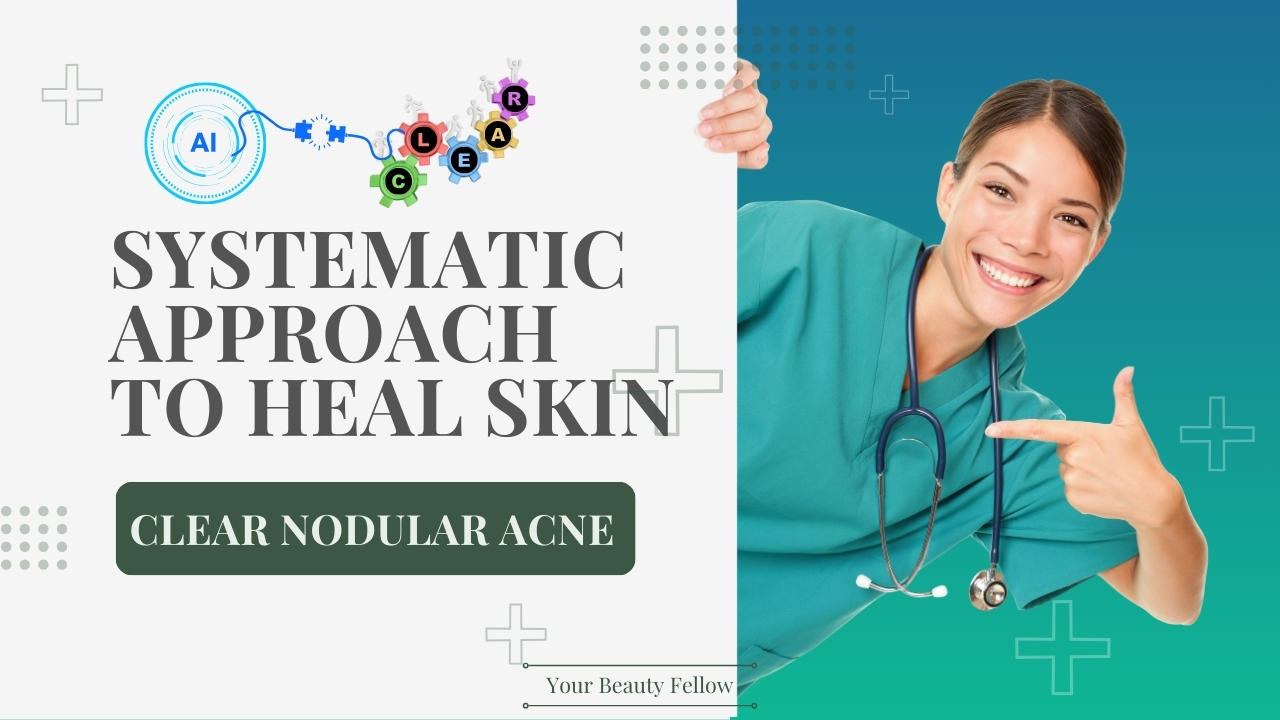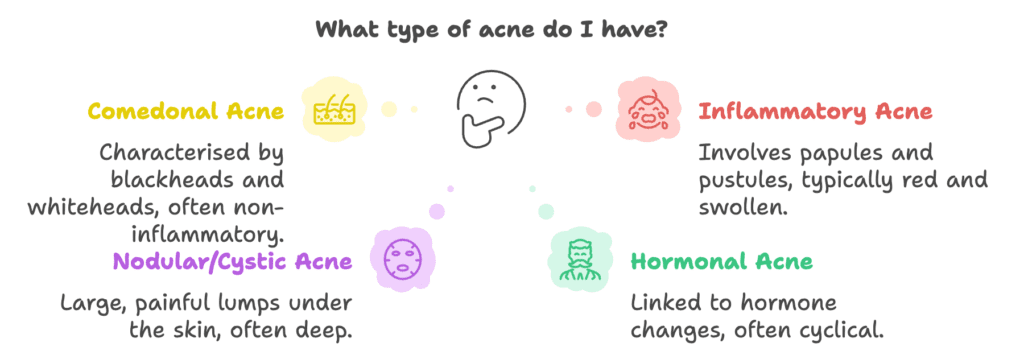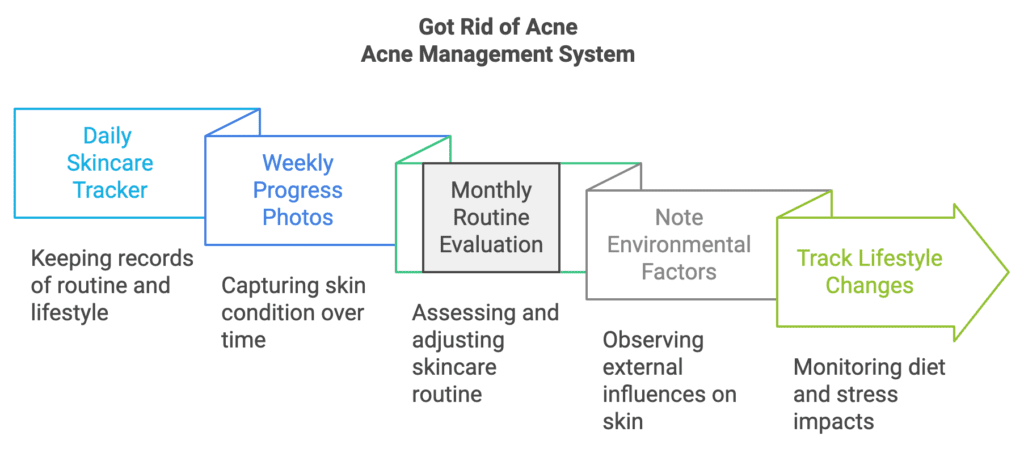
Nodular acne is one of the most severe forms of acne, affecting not only the skin but also self-confidence and emotional well-being. It often appears alongside other acne types—blackheads, whiteheads, papules, pustules, and even scars—making treatment more challenging.
This guide goes beyond treating nodular acne alone. We’ll cover how to manage multiple acne types simultaneously, integrate skincare with prescription treatments, and work with medical professionals to find the best solutions. By following a systematic approach using the CLEAR Skin Framework, supported by AI tools and consistent tracking, you can effectively clear your skin while maintaining motivation and emotional resilience.
Understanding Nodular Acne and Co-Existing Acne Types

Nodular acne develops deep within the skin, forming hard, painful lumps that don’t come to a head like other forms of acne. These nodules are caused by deep inflammation within the skin, often resulting from a combination of clogged pores, bacteria, and excess oil. Nodular acne can occur anywhere on the body, but it commonly affects: Face (jawline, cheeks, and chin), Chest, Back and shoulders.
Teenagers and young adults, particularly males, due to hormonal fluctuations that increase oil production. Most people with nodular acne also experience:
What’s the Priority?
When dealing with multiple acne types, the key is to focus on reducing inflammation and preventing scarring. Nodular acne requires medical intervention as it often damage deeper skin layers, leaving indented scars or dark marks, while other types can often be managed with an effective skincare routine. A combined approach ensures you target both immediate and underlying causes.
Why Prevention Is Crucial?
Preventing nodular acne involves addressing its root causes. Key steps include:
1. Balancing hormones through stress management, dietary adjustments, and, if needed, medical interventions.
2. Maintaining a consistent skincare routine that minimises pore-clogging and controls oil.
3. Targeting triggers such as diet or environmental factors.
4. Early intervention to treat breakouts before they worsen into nodules.
For those already experiencing nodular acne, prevention helps stop new nodules from forming while you focus on healing existing lesions.
Step-by-Step Treatment for All Acne Types
Medical Treatments for Nodular Acne
Nodular acne requires prescription treatments. Here’s an overview of options, along with their pros, cons, and timelines:
1. Oral Isotretinoin (Accutane)
- Pros: Highly effective, long-term results by reducing oil production and shrinking oil glands.
- Cons: Potential side effects like dryness, joint pain, and mood changes; requires regular blood tests.
- Timeline: Improvements within 3-4 months; full results in 6-12 months.
2. Oral Antibiotics
- Pros: Reduces bacterial growth and inflammation.
- Cons: Temporary solution; potential resistance with prolonged use.
- Timeline: Visible improvement in 4-8 weeks.
3. Topical Prescription Treatments
- Retinoids (e.g., tretinoin): Unclogs pores and reduces inflammation.
- Antibiotics (e.g., clindamycin): Targets surface-level bacteria.
- Cons: Initial irritation or purging phase.
- Timeline: 6-12 weeks for noticeable results.
4. Corticosteroid Injections
- Pros: Rapid relief for painful nodules.
- Cons: Only for individual nodules; cannot treat widespread acne.
- Timeline: Immediate reduction in swelling within 24-48 hours.
5. Hormonal Treatments
- Best for: Women with hormonal imbalances.
- Options: Birth control pills, spironolactone.
- Timeline: Results in 2-3 months.
Skincare Routine for Other Acne Types – with AI Tools & CLEAR Skin Framework

1. Classify Your Skin Type
Understanding your skin type (oily, combination, or sensitive) helps tailor a treatment plan. Nodular acne commonly affects oily or combination skin due to excess sebum. AI-powered tools can assess your acne’s severity, type, and specific needs.
2. Learn Your Skin Needs
Nodular acne requires treatments that:
- Penetrate deep into the skin.
- Reduce inflammation.
- Control bacterial growth.
- Prevent scarring.
AI tools, like acne scanners and virtual consultations, can help assess your skin and identify patterns or triggers (e.g., hormonal changes, diet).
3. Establish SMART Skin Goals
Set realistic, measurable goals, such as:
- Short-Term: Reduce inflammation within 4–6 weeks using prescribed treatments.
- Medium-Term: Prevent new nodules with hormonal or systemic interventions within 3–6 months.
- Long-Term: Minimise scars with professional care (e.g., laser or microneedling) over 6–12 months.
4. Assemble a Personalised Skincare Routine
An effective routine complements medical treatments and prevents further breakouts:
1. Morning Routine
- Cleanser: Use a gentle, non-stripping cleanser.
- Treatment: Apply a salicylic acid-based serum to unclog pores and reduce blackheads/whiteheads.
- Moisturiser: Choose a lightweight, non-comedogenic product.
- Sunscreen: Essential to prevent hyperpigmentation and protect from UV damage.
2. Evening Routine
- Cleanser: Use the same gentle cleanser to remove dirt and oil.
- Treatment: Apply prescription retinoids or benzoyl peroxide to target inflammation and bacteria.
- Moisturiser: Use a soothing moisturiser to counteract dryness from treatments.
3. Weekly Treatments
- Exfoliation: A mild chemical exfoliant like glycolic acid (1-2 times weekly) to remove dead skin.
- Soothing Masks: Incorporate clay or hydrating masks to calm inflammation.
5. Review and Track Your Progress
A skin tracker or journal helps you monitor how your skin responds to treatments, making it easier to adjust if needed. Consider using:
- AI-powered apps: Track acne severity, identify triggers, and visualise progress.
- Manual journals: Log daily skincare, diet, and treatment side effects.
Common Mistake: Over-Reliance on Prescriptions
Relying solely on prescription treatments without a solid skincare routine can lead to:
- Increased sensitivity and dryness.
- Frustration from slower-than-expected results.
Combining medical treatments with a tailored skincare routine optimises healing and prevents future breakouts.
How to Communicate with Your Healthcare Provider
Finding the best treatment starts with asking the right questions. When consulting a dermatologist or healthcare provider:
Key Questions to Ask
1. About Diagnosis:
- What type of acne do I have, and why am I experiencing it?
- Are there underlying factors like hormones or lifestyle contributing to my acne?
2. About Treatment Options:
- Which treatment do you recommend and why?
- What are the expected side effects and how can I manage them?
- What’s the realistic timeline for results?
3. About Combining Treatments:
- Can I incorporate my current skincare routine with this treatment?
- Are there products or habits I should avoid during treatment?
Emotional Well-Being: Staying Motivated on Your Skin Journey

Dealing with nodular acne can be emotionally taxing. Here’s how to stay proactive and positive:
1. Focus on Progress, Not Perfection
Remember that progress takes time. Focus on self-care and celebrate small victories.
2. Join Support Communities
Engage with others on platforms like Reddit Skincare to share experiences and learn from peers.
3. Seek Professional Support
A therapist or counsellor can help you cope with the psychological impact of severe acne.
Breaking the Cycle of Acne
Nodular acne may feel overwhelming, but with a personalised, systematic approach, you can achieve lasting results. By addressing all acne types, combining skincare with medical treatments, and staying consistent, you’ll see improvements over time.
Remember: Clear skin isn’t a quick fix—it’s a journey. Use the CLEAR Skin Framework, AI tools, and support from professionals and communities to stay on track. With patience and persistence, you can reclaim your skin and confidence.
Frequently Asked Questions
What Exactly Is Nodular Acne and How Is It Different from Other Acne Types?
Nodular acne is a severe form of acne that develops deep within the skin, forming hard, painful lumps that don’t come to a head. Unlike surface-level acne like pustules or papules, nodular acne occurs in deeper skin layers, causing significant inflammation and potential scarring. It’s typically larger, more painful, and requires medical intervention unlike milder acne types.
Can Nodular Acne Be Completely Cured?
While complete “cure” isn’t guaranteed, nodular acne can be effectively managed and significantly reduced through a comprehensive approach. This involves medical treatments like oral isotretinoin, prescription topicals, addressing hormonal imbalances, maintaining a consistent skincare routine, and using AI-powered tracking tools to monitor progress and identify triggers.
What Are the Most Effective Medical Treatments for Nodular Acne?
The most effective medical treatments include oral isotretinoin (Accutane), which reduces oil production and shrinks oil glands, oral antibiotics to control bacterial growth, topical retinoids to unclog pores, corticosteroid injections for rapid individual nodule relief, and hormonal treatments like birth control pills for women with hormonal imbalances.
How Long Does It Take to See Improvements in Nodular Acne?
Improvement timelines vary: oral isotretinoin shows results in 3-4 months with full effects in 6-12 months, oral antibiotics typically show improvements in 4-8 weeks, topical treatments take 6-12 weeks, and hormonal treatments often show changes in 2-3 months. Consistency and a systematic approach are crucial for visible progress.
Are There Lifestyle Changes That Can Help Manage Nodular Acne?
Yes, lifestyle changes can significantly impact nodular acne. These include managing stress, maintaining a balanced diet, staying hydrated, getting adequate sleep, avoiding touching your face, using non-comedogenic products, managing hormonal balance, and maintaining a consistent skincare routine that targets inflammation and prevents clogged pores.
Can Teenagers and Young Adults Effectively Manage Nodular Acne?
Absolutely. Teenagers and young adults can manage nodular acne through a combination of medical guidance, targeted skincare routines, and lifestyle modifications. The key is early intervention, working with healthcare professionals, using AI tools to track progress, addressing hormonal fluctuations, and maintaining consistent treatment and skincare practices.
What Psychological Support Is Available for Those Dealing with Nodular Acne?
Support options include joining online skincare communities like Reddit, seeking counselling to manage emotional impacts, focusing on progress over perfection, celebrating small victories, and connecting with support groups. Professional therapists can also help individuals cope with the psychological challenges of severe acne, building resilience and self-confidence.






